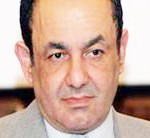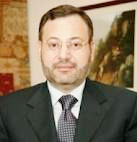Following reports of clashes between Islamist and liberal protesters in Tahrir Square last Friday, columnists continue to write about the persistent request to apply Islamic jurisprudence in Egypt. In a similar framework, more than one writer has explored the constitutional article that relates to Al-Azhar, asserting that views of prominent Sheikhs will be taken into consideration in any issue that relates to Shari’a. Many columnists express their fear that Al-Azhar would use this article to interfere in politics.
Amr Al-Shobaki
Shari’a Friday: a fabricated battle
Al-Masry Al-Youm newspaper

Al-Shobaki condemns extremist Salafis who call for the literal implementation of Islamic jurisprudence when they are hardly qualified to talk on behalf of Islam. Last Friday was a tedious repetition to the one that preceded. Thousands of Islamist protesters gathered in Tahrir to demand the application of Shari’a, which according to the writer, nobody has really neglected in day-to-day life. Calling for a literal practice of Shari’a is a fabricated battle for Salafis, according to Al-Shobaki.
Regardless of the right to peaceful protest, the columnist finds it meaningless for thousands of extremists to persistently call for something that is a delusion. The rise of Salafis stemmed from the security vacuum after the 25 January revolution, that ousted Mubarak but did not impose harsh penalties on radical thinking.
Claiming to be the guardians of Islam, Salafis have seemingly forgotten that what they call for is no more than a narrow explanation of Islam and its tolerance, Al-Shobaki notes. Those who fight in a fabricated battle have failed to present a single model of a true Muslim, which cares more about corruption and fighting poverty than yelling for Shari’a.
Two hours with the Salafis
Emad Al-Din Hussein
Al-Shorouk newspaper
Reflecting on his 120-minute meeting with Salafis last Friday, Hussein makes a number of observations on this Islamist trend. One of the main features of Salafis is the diversity of their schools. A lot of liberals deal with Salafis as if they are one block, ignoring that many of them are open-minded but their openness is often overshadowed by the extremist majority.
Hussein states that during his meetings with hundreds of Salafis in Tahrir Square on Shari’a Friday, many clearly stated their opposition to what they describe as “liberal media”. He was asked, “how can you speak on behalf of democracy when you can hardly believe in its concepts?”
The columnist then recalls a group of Salafis who went to vandalise a large mural of the revolution’s martyrs and then attacked by a number of liberals who chanted against the Muslim Brotherhood and the general guidance bureau. For Hussein, protesters with liberal inclinations contributed to the tension between the two groups on Friday.
If the day is known to be organised by Salafi groups, the writer wonders why would a liberal protester go there if not to seek a clash? According to the writer, the main problem with Salafis is their lack of political experience. Many of them cannot differentiate between the number of Islamists in the dissolved parliament and that in the Constituent Assembly. Most of them blindly focus on Islamic Shari’a as a matter of life and death.
The constitution battle in Egypt
Ahmed Mansour
Al-Watan newspaper
Persistent attempts to hinder the work of the Constituent Assembly seem endless, Mansour believes. The main challenge to the constitution is the staunch endeavor of those inside the assembly to cause pointless conflicts around so-called controversial articles. Many of those who failed to join the assembly believe that the body is incomplete without their presence.
Mansour chides some members who seek exposure by speaking negatively about the draft constitution on evening talk shows and radio programmes. If one follows the debates around the constitutional drafts, the writer states it seems quite childish of those who pop up in the media to speak about nothing but empty arguments.
Mansour spoke with a group of assembly members who assured him that those who quarrel are merely seeking attention. Putting off the final version of the constitution might lead to the dissolution of the entire assembly. Mansour says many members, who are pushing for this, claim they are safeguarding the revolution and its goals.
However, the further delay of the constitution will lead to more chaos and a prolonged period without a governing constitution. The number of pitfalls for the 25 January revolution has exceeded all expectations. The constitution is one of the products directly linked to the uprising. If one is not produced soon, the revolution is in serious danger, writes Mansour.
A call to Al-Azhar
Moataz Billah Abdel-Fatah
Al-Watan newspaper

The constitutional article that would enable prominent Al-Azhar Shiekhs to state their opinions on issues related to Islamic jurisprudence worries Abdel-Fatah. Unlike many who clash over article 2 that relates to the application of principles or regulations of the Shari’a, the writer scrutinises the danger of the Al-Azhar article because it implies the intervention of Al-Azhar scholars in shaky political issues. If Al-Azhar Sheikhs are to be considered in issues of Islamic jurisprudence, the writer questions which institution will be calling on them for interference.
The article states that their opinion “will be taken into consideration” and this implies that the positions of Al-Azhar Sheikhs will always be deemed vital due to the significance and weight of the institution in Egypt.
The writer asks if the presidency is the institution that is supposed to call upon Sheikhs for their comments or if there will be a certain number of parliamentarians who can also call upon certain Sheikhs and request their opinions? Abdel-Fatah then recalls the Iranian constitution, which includes a similar article but states that the parliament cannot issue laws that contradict the official religious school of thought.
Indeed the Iranian constitution is not our model, but the writer stresses the risk of involving an independent religious institution in political games. If Al-Azhar joined the political arena, the writer believes that many political powers would be more vulnerable to pointless conflicts.





